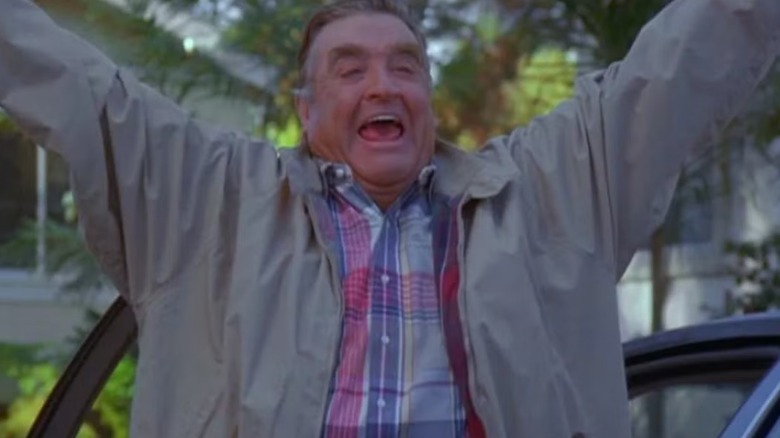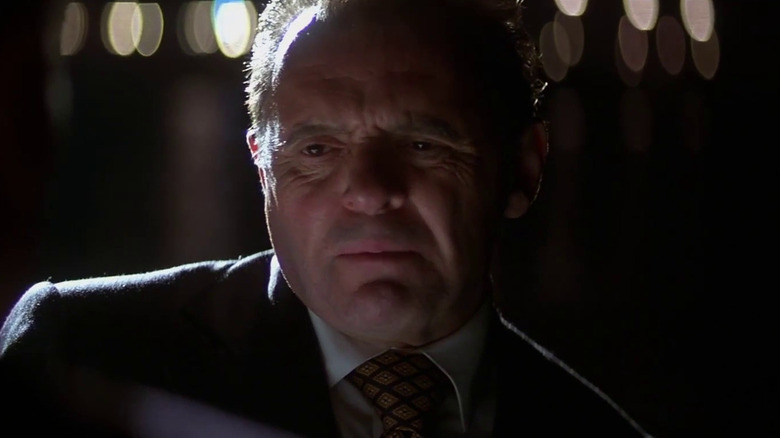The Seinfeld Episode That Hilariously Pays Tribute To An Anthony Hopkins Movie
We may receive a commission on purchases made from links.
The "Seinfeld" season 7 two-parter "The Cadillac" is mostly remembered for being (to borrow the titling parlance of a '90s sitcom competitor) the one where George (Jason Alexander) goes on a date with Marisa Tomei (playing herself). But the title of the episode has nothing to do with that storyline!
Jerry (Jerry Seinfeld) has just gotten back from an extremely well-paying comedy gig. We don't see the number on the check but it makes Kramer (Michael Richards) jump. So, Jerry decides to do something uncharacteristically nice. His father Morty (Barney Martin, having long-replaced Phil Bruns) has dreamed of owning a Cadillac but never been able to afford one. So Jerry flies down to Florida with a surprise gift for his dad. But this being "Seinfeld," even these good intentions lead to trouble.
Morty is his condo association's president. The new Cadillac makes his fellows think he's embezzling money. By the end of the episode, they vote to impeach Morty and the Seinfelds have to leave the condo in shame. But hey, at least they keep the Cadillac! Before driving off, Morty turns back to a crowd of his former neighbors and raises his arms above his head. This calls to mind the image of another (almost) impeached president: After Richard Nixon resigned in 1974 and left the White House, he gave his trademark two-handed peace sign and shifty grin.
The Nixon homage goes even deeper than that. The final scene has an unusually dramatic score for "Seinfeld." That's because it's a homage to the ending of Oliver Stone's presidential biopic "Nixon," a movie scored by John Williams and starring Anthony Hopkins as Tricky Dick himself.
Seinfeld's The Cadillac ends just like Oliver Stone's Nixon
In a "Seinfeld" behind-the-scenes featurette, series composer Jonathan Wolff described the ending of "The Cadillac" as him "nodding towards John Williams," who received an Oscar nomination as Best Composer for his "Nixon" score. The episodes first aired in February 1996, so "Nixon" (which premiered in December 1995) was fresh on the cultural mind.
"Nixon" is made in the style of "Citizen Kane." The movie chronicles Nixon's life story in flashbacks from the framing device of the final hours of his presidency. The film takes three hours to only scratch the surface of Nixon's life and complexity, and in that scratching finds one of the best movies about a real U.S. President ever. Hopkins himself is so good you'll think he's been possessed by Nixon's ghost! A great actor can overcome physical differences between them and their character and Hopkins does just that. He may not look perfectly like the real Nixon, but he's got the voice, sweaty brow, and self-pity down pat.
Previously, Stone had made "JFK," about the assassination of President John F. Kennedy, in 1991. So of course he then made a picture about the just as famous downfall of another President, specifically the one most contrasted with JFK.
Kennedy and Nixon were of course opponents in the 1960 presidential election. Kennedy, the patrician with a smile right out of Hollywood, won of course, delivering another blow to social striver Nixon's intertwined inferiority complex and hunger for power. In the last pre-credits scene of the film, Hopkins' Nixon looks at a portrait of JFK and observes to both himself and his late predecessor: "When [the American people] look at you, they see what they want to be. When they look at me, they see what they are."
This scene ends with Nixon deciding to resign to avoid impeachment and walking through a doorway guided by his wife Pat (Joan Allen). The credits feature a mix of staged scenes (Hopkins recreating Nixon's final press conference as president) and real historical footage, from Nixon leaving the White House to his funeral in 1994.
Though "Nixon" may demand a lot more attention than a typical "Seinfeld" episode before it reaches that ending, it's a journey worth taking.

